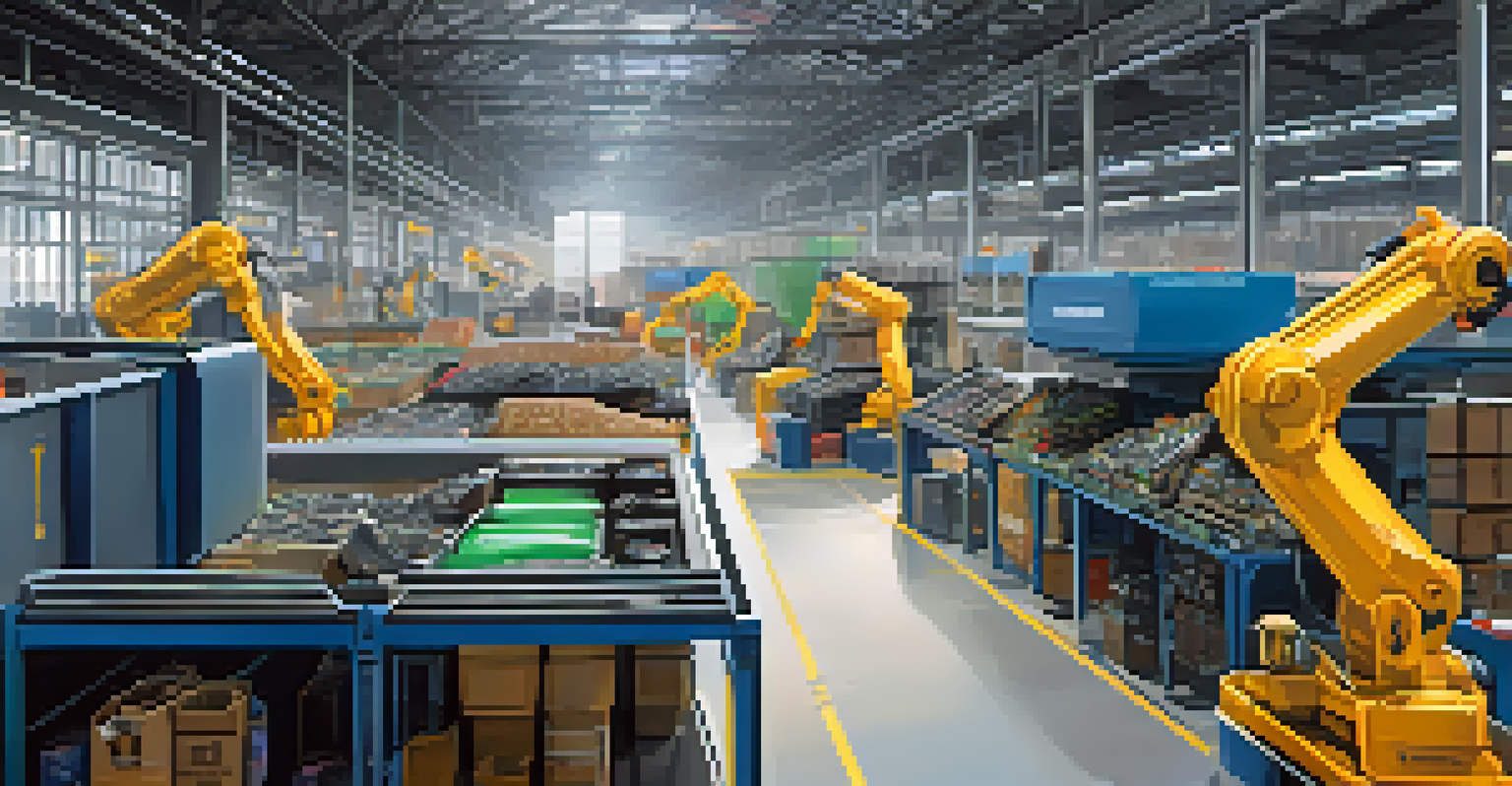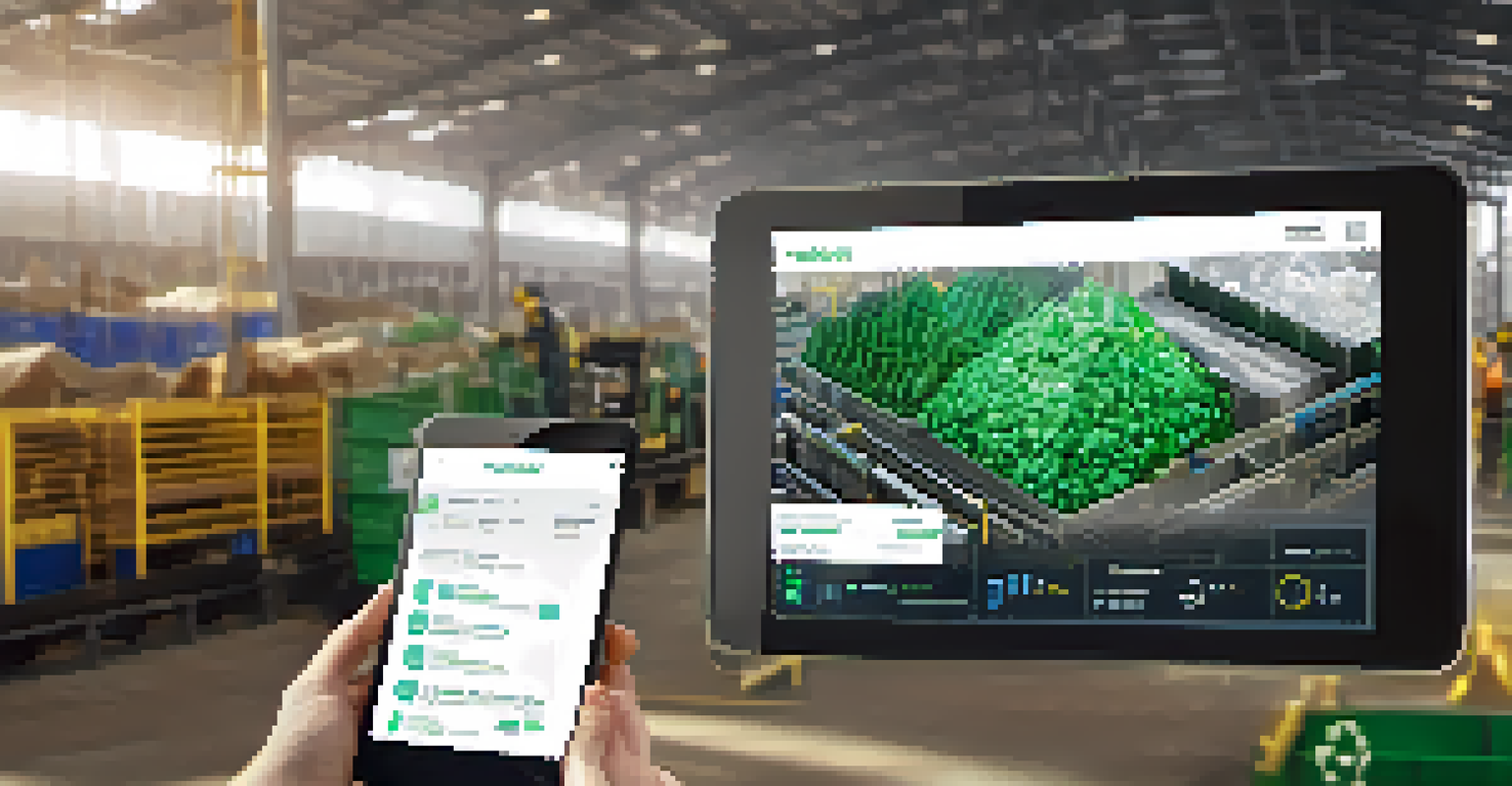Tech Innovations in Waste Management and Recycling

The Rise of Smart Bins in Urban Areas
Smart bins are revolutionizing how we manage waste in cities. Equipped with sensors, these bins can monitor their fill levels and notify waste management services when they need to be emptied. This not only reduces overflow but also optimizes collection routes, saving time and fuel.
Waste is a resource in the wrong place.
Imagine walking through a park and seeing a bin that lights up when it’s full. This interactive element not only encourages responsible disposal but also engages the community in keeping their environment clean. Smart bins are now becoming a common sight in many urban areas, showcasing how technology can enhance our daily lives.
With the integration of mobile apps, users can also track the nearest available bin, making waste disposal more convenient. This tech-driven approach leads to cleaner streets and a more efficient waste management system, paving the way for greener cities.
AI-Powered Sorting Technologies for Recycling
Artificial intelligence (AI) is changing the game for recycling facilities. With advanced image recognition capabilities, AI can identify and sort recyclable materials with remarkable accuracy. This reduces human error and increases the amount of waste that gets properly recycled.

For instance, facilities equipped with AI systems can sort plastics from metals and paper at lightning speed. This means less contamination in recycling streams, leading to higher quality recycled materials. The efficiency of these systems also allows for a greater volume of waste to be processed in less time.
Smart Bins Enhance Waste Management
Smart bins equipped with sensors optimize waste collection by monitoring fill levels and improving collection routes.
Moreover, as these technologies improve, they become more accessible to smaller recycling operations. This democratization of technology means that even local facilities can benefit from AI, contributing to a more sustainable future for waste management.
Blockchain for Transparency in Recycling Processes
Blockchain technology is making waves in waste management by ensuring transparency and accountability. By creating a tamper-proof ledger of recycling activities, stakeholders can track materials from collection to processing. This builds trust among consumers and businesses alike.
The future is not something we enter. The future is something we create.
Consider how a beverage company can showcase its recycling efforts through blockchain. Consumers can scan a QR code to see the entire journey of the bottle they just recycled, from collection to its transformation into new products. This level of transparency empowers consumers to make informed choices.
Additionally, blockchain can help combat fraud in recycling programs, where some entities might misreport their recycling rates. By verifying every step of the process, blockchain fosters integrity, encouraging more businesses to participate in sustainable practices.
Robotics Enhancing Efficiency in Waste Collection
Robotic technology is stepping into the waste management arena, aiding in collection and sorting processes. These robots can handle heavy lifting, navigate through challenging environments, and even identify different types of waste. This not only reduces the physical strain on workers but also enhances overall efficiency.
For example, some waste collection robots are designed to autonomously pick up litter in public spaces. They can patrol parks and streets, collecting waste while providing data on litter patterns. This proactive approach helps cities to strategize their waste management initiatives effectively.
AI Revolutionizes Recycling Processes
AI-powered sorting technologies significantly increase recycling efficiency by accurately identifying and sorting materials.
In recycling facilities, robots equipped with AI can sort through materials faster than a human can. This increased efficiency means that more recyclables are processed, contributing to a circular economy where materials are reused rather than discarded.
Mobile Apps Empowering Community Recycling Efforts
Mobile applications are becoming essential tools for promoting recycling at the community level. These apps provide users with information about local recycling programs, collection schedules, and even tips on how to recycle properly. They empower individuals to take an active role in waste management.
For instance, a user-friendly app can remind residents when to put out their recycling bins, reducing the chances of missed pickups. Furthermore, some apps incorporate gamification elements, rewarding users for their recycling efforts, which fosters a sense of community and encourages participation.
These digital platforms also serve as a bridge between residents and local authorities, allowing for feedback and suggestions on improving waste management services. By utilizing technology, communities can work together to create a cleaner, more sustainable environment.
Circular Economy Initiatives Driven by Technology
The concept of a circular economy is gaining traction, and technology is at the forefront of this movement. Companies are leveraging innovative solutions to minimize waste and maximize resource use. This approach not only benefits the environment but can also lead to significant cost savings.
For example, some businesses are using technology to track their material usage and identify areas for improvement. By analyzing data, they can find ways to reduce waste in their production processes. This not only reduces their environmental footprint but can also enhance their brand image.
Blockchain Improves Recycling Transparency
Blockchain technology provides a tamper-proof ledger for recycling activities, ensuring accountability and consumer trust.
Moreover, platforms that connect consumers with businesses offering recycled products are also emerging. These online marketplaces promote the idea of reusing materials, making it easier for consumers to make sustainable choices. Technology is thus driving a shift towards more responsible consumption and production.
Innovations in Waste-to-Energy Technologies
Waste-to-energy (WTE) technologies are evolving to provide sustainable solutions for waste management. These processes convert non-recyclable waste into usable energy, such as electricity or heat. As technology improves, WTE plants are becoming more efficient and environmentally friendly.
For instance, modern WTE facilities utilize advanced combustion technologies that minimize emissions and maximize energy output. This means that waste that would otherwise end up in landfills is being transformed into a valuable resource, contributing to energy security.

Additionally, innovations in gasification and anaerobic digestion are emerging as viable alternatives to traditional incineration. These methods break down waste at a molecular level, resulting in cleaner energy production. The shift towards WTE technologies represents a significant step in achieving sustainable waste management.
The Future of Waste Management: Integrated Tech Solutions
Looking ahead, the future of waste management lies in integrated technology solutions. By combining various innovations—from smart bins to AI-powered sorting—waste management systems can become more efficient and sustainable. This holistic approach addresses the challenges of waste management in a comprehensive manner.
Cities are beginning to implement these integrated systems, where data from different technologies is shared and analyzed. This collaboration leads to smarter decision-making and better resource allocation, ultimately enhancing the quality of waste management services.
As we continue to innovate and embrace new technologies, we can look forward to a future where waste is minimized, resources are conserved, and our communities are cleaner. The journey towards sustainable waste management is just beginning, and technology will play a pivotal role in shaping this future.